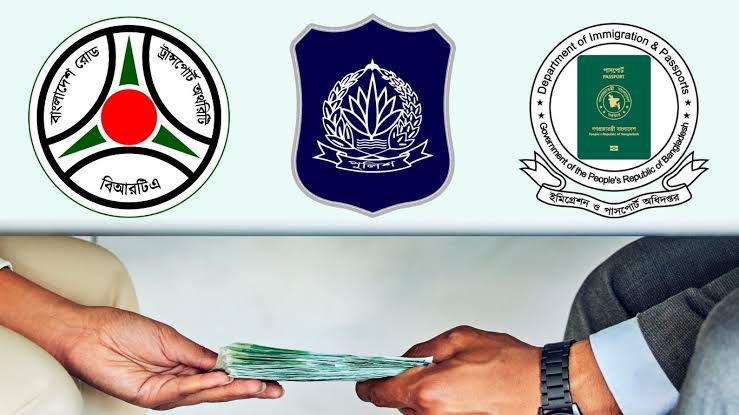Staff Correspondent
Published:2025-06-19 23:26:39 BdST
BRTA, law enforcers, passport office top list of most corrupt public bodies: Reports
A staggering 31.67% of citizens who accessed public services in the past year reported experiencing bribery or corruption, according to the 2025 Citizen Perception Survey (CPS) released on Thursday by the Bangladesh Bureau of Statistics (BBS).
Among the most corruption-prone public service institutions, the Bangladesh Road Transport Authority (BRTA) topped the list, with 63.29% of service recipients reporting bribery.
This was followed by law enforcement agencies (61.94%), the passport office (57.45%), and the land registry office (54.92%).
Men were more likely to experience corruption (38.62%) compared to women (22.71%).
Public perception of safety
Despite governance challenges, 84.81% of citizens said they felt safe walking alone in their neighborhoods after dark. However, the perception of safety was lower among women (80.67%) compared to men (89.53%). Urban residents (83.75%) reported slightly lower safety levels than rural residents (85.30%).
Inside their own homes after dark, an overwhelming 92.54% of citizens felt safe—with 91.82% of women and 93.35% of men expressing this confidence.
Freedom of expression and political participation
The survey found that only 27.24% of respondents believed they could express opinions about government actions. Gender disparities were notable—31.86% of men felt free to express views compared to 23.02% of women.
Just 21.99% of citizens felt they could influence political decision-making, with male confidence (26.55%) again higher than female (17.81%).
Government health services
Nearly 47.12% of respondents had accessed public health services at least once in the past year. Among them:
82.72% found services easily accessible
89.34% considered the costs affordable
Satisfaction rates were moderate: 65.07% for service quality, 63.13% for staff behavior, and 63.19% for doctors’ time spent with patients.
Access to education
About 40.93% of citizens reported having at least one child enrolled in public primary or secondary schools.
96.46% found primary schools within 30 minutes of home
92.66% found costs affordable at primary level
For secondary schools: 82.20% reported accessibility and 80.86% found costs affordable
Perceived quality of education: 67.93% at primary level and 71.86% at secondary level.
Other government services
For services like ID issuance or civil registration:
78.12% said services were available
86.28% said costs were within reach
However, satisfaction with service efficiency (62.60%), equal treatment (56.26%), and timely delivery (51.28%) was comparatively lower.
Justice and dispute resolution
Over the past two years, 16.16% of citizens faced some form of conflict or dispute. Among them:
83.60% accessed formal or informal justice mechanisms
41.34% used formal systems (e.g., courts, police)
68.96% turned to informal channels (e.g., community leaders, local lawyers)
Discrimination and harassment
In the past year, 19.31% of respondents experienced some form of discrimination or harassment. This was slightly higher among women (19.62%) than men (18.97%).
Urban areas saw more cases (22.01%) than rural areas (18.07%).
Top causes:
socio-economic status (6.82%), gender (4.47%)
Most common locations: within family (48.44%), in public transport/open spaces (31.30%), and at the workplace (25.97%).
Only 5.35% of victims reported the incidents.
The CPS 2025 covered 84,807 respondents from 45,888 households across 1,920 sampling units in all 64 districts.
The survey followed international standards set by UNDP, UNODC, and OHCHR to monitor progress on SDG 16, focusing on peace, justice, and strong institutions.
Unauthorized use or reproduction of The Finance Today content for commercial purposes is strictly prohibited.


